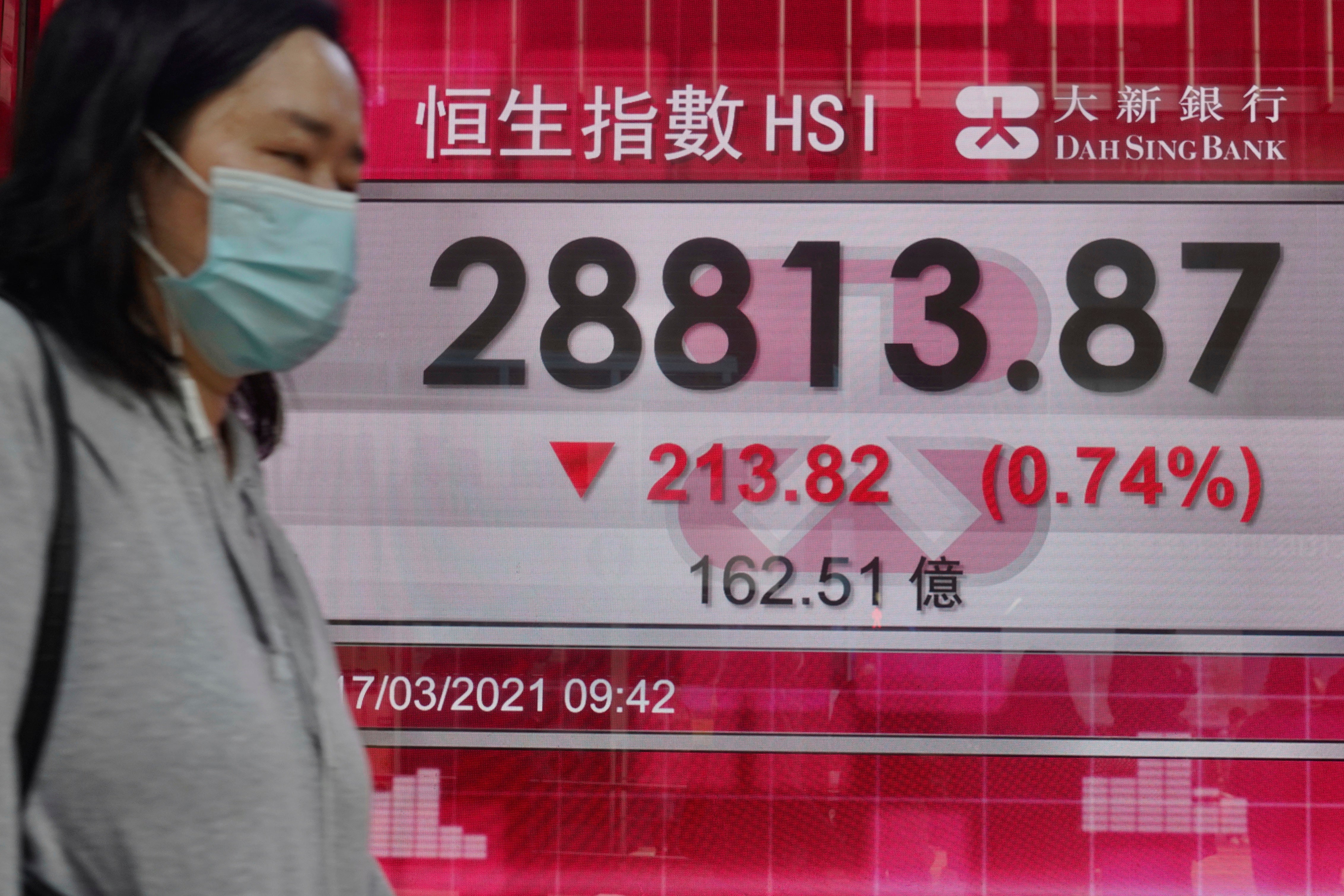Asian shares slip ahead of Fed's view on US economic outlook
Asian shares fell in muted trading as world markets cautiously awaited the U.S. central bank’s latest assessment on the economy

Your support helps us to tell the story
From reproductive rights to climate change to Big Tech, The Independent is on the ground when the story is developing. Whether it's investigating the financials of Elon Musk's pro-Trump PAC or producing our latest documentary, 'The A Word', which shines a light on the American women fighting for reproductive rights, we know how important it is to parse out the facts from the messaging.
At such a critical moment in US history, we need reporters on the ground. Your donation allows us to keep sending journalists to speak to both sides of the story.
The Independent is trusted by Americans across the entire political spectrum. And unlike many other quality news outlets, we choose not to lock Americans out of our reporting and analysis with paywalls. We believe quality journalism should be available to everyone, paid for by those who can afford it.
Your support makes all the difference.Asian shares fell in muted trading Wednesday as world markets cautiously awaited the U.S. central bank's latest assessment on the economy.
Japan's benchmark Nikkei 225 inched down less than 0.1% to finish at 29,914.33. South Korea's Kospi slipped 0.6% to 3,050.17. Australia's S&P/ASX 200 dipped 0.5% to 6,795.20. Hong Kong's Hang Seng edged down nearly 0.1% to 29,014.67, while the Shanghai Composite was little changed, down less than 0.1% at 3,444.70.
Investors are awaiting the Federal Reserve’s economic and interest rate projections, expected later in the day. Economists expect Fed Chair Jerome Powell will try to convince jittery financial markets that the central bank can continue providing support without igniting inflation.
Those worries have recently pushed bond yields higher, sapping buying demand for shares.
The Fed meeting “carries the potential to either allay or heighten some of the market’s recent concern with regard to the soaring bond yields,” said Jingyi Pan, senior market strategist at IG in Singapore.
Jeffrey Halley, senior market analyst Asia Pacific at OANDA said U.S. Secretary of State Antony Blinken s comments about China, while visiting Japan and South Korea, also dampened regional sentiments.
“The comments suggest that relations between the two superpowers remain as troubled as ever and does not bode well for the meeting tomorrow and Friday between senior officials of both countries. That state of affairs is adding to the glum mood on the China Mainland,” Halley said.
Blinken, after he and Defense Secretary Lloyd Austin met Tuesday with their Japanese counterparts, denounced China, saying, “We will push back if necessary, when China uses coercion or aggression to get its way.”
Wall Street capped a choppy day of trading with indexes closing mostly lower. Losses by banks, industrial stocks and companies that rely on consumer spending, including cruise line operators, outweighed gains by Big Tech and communication services stocks.
The S&P 500 dropped 0.2% to 3,962.71. The Dow Jones Industrial Average lost 0.4% to 32,825.95. The Nasdaq bucked the trend, benefiting from the rally in technology stocks and rising 0.1%, to 13,471.57.
The big technology names that soared in 2020 were among the gainers. Apple rose 1.6%, Google’s parent Alphabet added 1.4% and Facebook rose 2%.
Small company stocks lagged the broader market. The Russell 2000 index shed 1.7%, to 2,319.52.
Investors weighed new economic data Tuesday that showed Americans cut spending last month, partly due to bad weather in wide parts of the country that kept shoppers away from stores, and partly due to December and January stimulus payments running out.
Retail sales fell a seasonally adjusted 3% in February from the month before, the U.S. Commerce Department said Tuesday. February's drop followed soaring sales in January as people spent $600 stimulus checks sent at the end of last year. In fact, the Commerce Department revised the rise in January to 7.6% from the previously reported 5.3%.
Meanwhile severe winter weather pushed industrial production down a sharp 2.2% in February, reflecting a big decline in factory output.
“We’re still in the midst of getting back to a more normal environment,” said Jason Pride, chief investment officer of private wealth at Glenmede. “Given the lumpiness of government stimulus payments, we're going to see numbers jumping around.”
Investors are betting big that this economic malaise will dissipate as spring arrives and more Americans get vaccinated against the coronavirus. Further, President Joe Biden's administration started sending out $1,400 stimulus checks to individuals last weekend.
In energy trading, U.S. benchmark crude rose 47 cents to $65.27 a barrel in electronic trading on the New York Mercantile Exchange. It lost 59 cents to $64.80 on Tuesday. Brent crude, the international standard, gained 45 cents to $68.84 a barrel.
In currency trading, the U.S. dollar rose to 109.08 Japanese yen from 108.99 yen. The euro cost $1.1907, up from $1.1903.
___
AP Business Writers Damian J. Troise and Alex Veiga contributed.